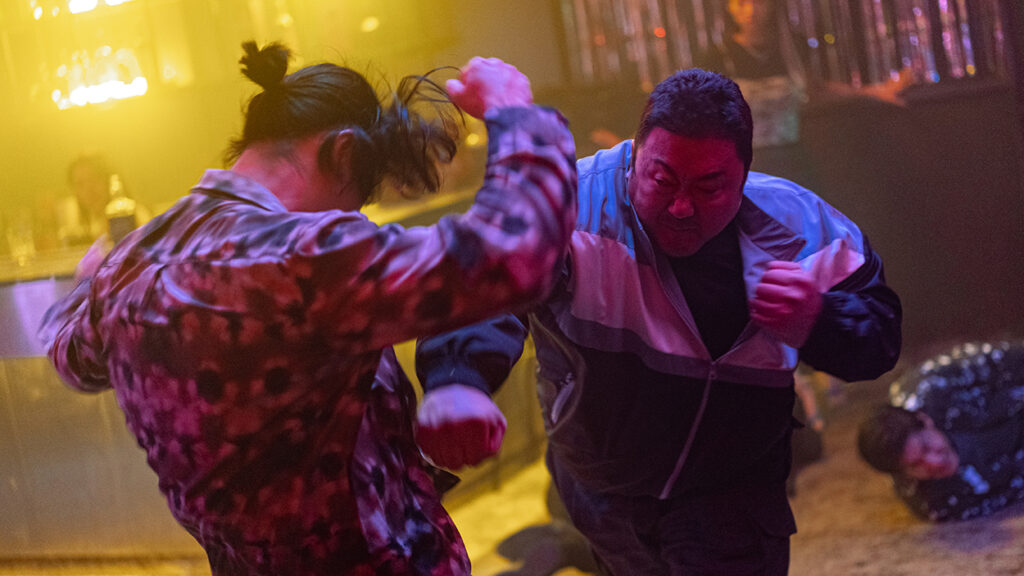Ma Dong-seok has found his niche. Last summer brought us The Roundup, the sequel to Ma’s hit 2017 vehicle, The Outlaws, and here we already have the third film in that series, with a fourth ostensibly on the way (there’s a preview embedded in the end credits of No Way Out). Apparently, Ma has designs on an additional four films to follow that one, too. The original Roundup film was based on a true story, but the series has evolved into action/crime films of admirable purity, each putting Ma on the trail of vicious gangsters. He’s smarter than his peers, but more importantly, he’s the biggest, baddest man in town. His investigations proceed thusly: find a guy, beat him up until he gives Ma the name of another guy, then find that guy and beat him up until he names the next guy, and so on, until the final boss. It’s an endlessly repeatable formula because, despite the amorality of it all, it’s just so much fun watching Ma at work.
The case this time revolves around a new drug on the Korean club scene: “Hiper” has been stolen from Japanese yakuza by a conglomeration of Korean and Japanese gangsters, who hope to sell it to the Chinese Triads. Ma and his team of well-meaning but almost entirely superfluous detectives take on the case after a young woman falls from a hotel window. One thing leads to another, and the cops find themselves neck deep in a series of betrayals and revenge killings taking place among the various gangs. Only Ma is tough enough, and smart enough, to figure out what exactly is going on — and to survive it.
If the Roundup series is defined by anything (aside from Ma’s enormous presence and a winking attitude toward police brutality and due process), it’s a certain degree of xenophobia. The villains in the first film are Chinese, and in the second, while the villain is a Korean preying on Koreans in Vietnam, the Vietnamese police are depicted as completely unhelpful, at best, to Ma’s noble pursuit of justice. This trend continues in No Way Out, of course, with its yakuza and Triads causing so much trouble. But the film leavens this read through the fact that the prime mover of all the violence is Korean, and ultimately revealed to be a cop, no less. It seems doubtful that the intention here is to conflate the Korean police with yakuza and Triads — but if so, that would mark a move in a decidedly progressive direction for such a fundamentally conservative series.
Regardless, the bad cop is played by Lee Joon-hyuk, who wears sharp suits, has coiffed hair, and stares down his opponents with crazy eyes. His stylish coolness and aura of explosive menace contrasts perfectly with Ma’s lumbering everyman, windbreaker ever present, constantly warning people not to get in a fight with him, then knocking them out with an exasperated single punch when they don’t listen. Given Ma’s blithe disregard for the civil rights of witnesses, the comparison here isn’t so much good cop/bad cop as it is bad cop/much, much worse cop. The two are surrounded by the usual colorful array of schemers, punks, silent killers, and other generic punching bags, though there is also a fun featured role for Aoki Munetoka as a yakuza enforcer. If you’ve ever wanted to see a man slice up a hallway full of gangsters with a katana, this is the movie for you.
No Way Out, like the other Roundup films, is built around these simple pleasures. Director Lee Sang-yong films the fights with a clarity of purpose commensurate with their base purity. Ma Dong-seok is a martial artist of power, not of acrobatics, and the choreography and camerawork reflect that. Men rush at him with weapons (knives, aluminum bats, a sword) and he punches them (in the stomach or the head). Some men get up after that first punch, but most don’t. The choreography swirls around Ma, but he punctuates every movement with a decisive blow. The editing is for clarity, above all, though occasionally Lee throws us in the middle of the action, such that a sudden edit puts us on the receiving end of Ma’s fist. It’s terrifying and hilarious at the same time. Hit us again, big man.
Published as part of InRO Weekly — Volume 1, Issue 22.


Comments are closed.